Editor’s Note: Robin North is a member of LTV’s sponsored content team, The Leisure Explorers. Do you own a Leisure Travel Van and enjoy writing? Learn more about joining the team.
I had dinner with my brother recently. We had stopped to visit him while traveling up the coast. He seemed fascinated with our Unity and, after touring it, he turned to me and asked, “Whatever made you buy an RV?”
It was a fair question. Growing up, our only experience with camping was one fishing trip with my dad and one outing with the Scouts. We weren’t exactly an outdoorsy family. I thought about it for a moment and responded, “We wanted to be able to get away without airline tickets, huge suitcases, and crowded hotels.”
We both had a laugh and he continued.
“Okay, so here’s the big question: With what you know now, would you buy one again?”
Then he sat back and smiled like a Cheshire cat. Hmm, an interesting question. That’s when I realized he was toying with the RV idea himself.
We had bought our RV after conducting a lot of research. We looked at large Class A RVs, fifth-wheels, trailers, and small RVs. I think we must have toured hundreds of them. We poured over websites and books and badgered our RVing friends with questions. This was uncharted territory for us, not to mention a rather large sum of money, so we wanted to make sure we conducted our due diligence. What triggered the final decision to purchase was one phrase uttered by a friend who was retiring.
“On Friday, we’ll pack up the RV, drive to the end of the street, and my husband will ask me, ‘Which way do you want to go?'”
In the midst of stressful careers and an overburdened calendar of activities, that sounded wonderful.
Today, after almost five years and thousands of miles under our tires, we have had our share of mishaps with the RV – some the result of ignorance and some the kinds of things that go wrong with anything mechanical. But, I answered my brother’s question as to whether I would do it again with a definite, “Yes“. We love the RV and the freedom it provides, but there are a few things I would like to have known before I bought my RV. Knowing the answers to those questions wouldn’t have prevented my purchase, but I would have felt more confident in starting out.
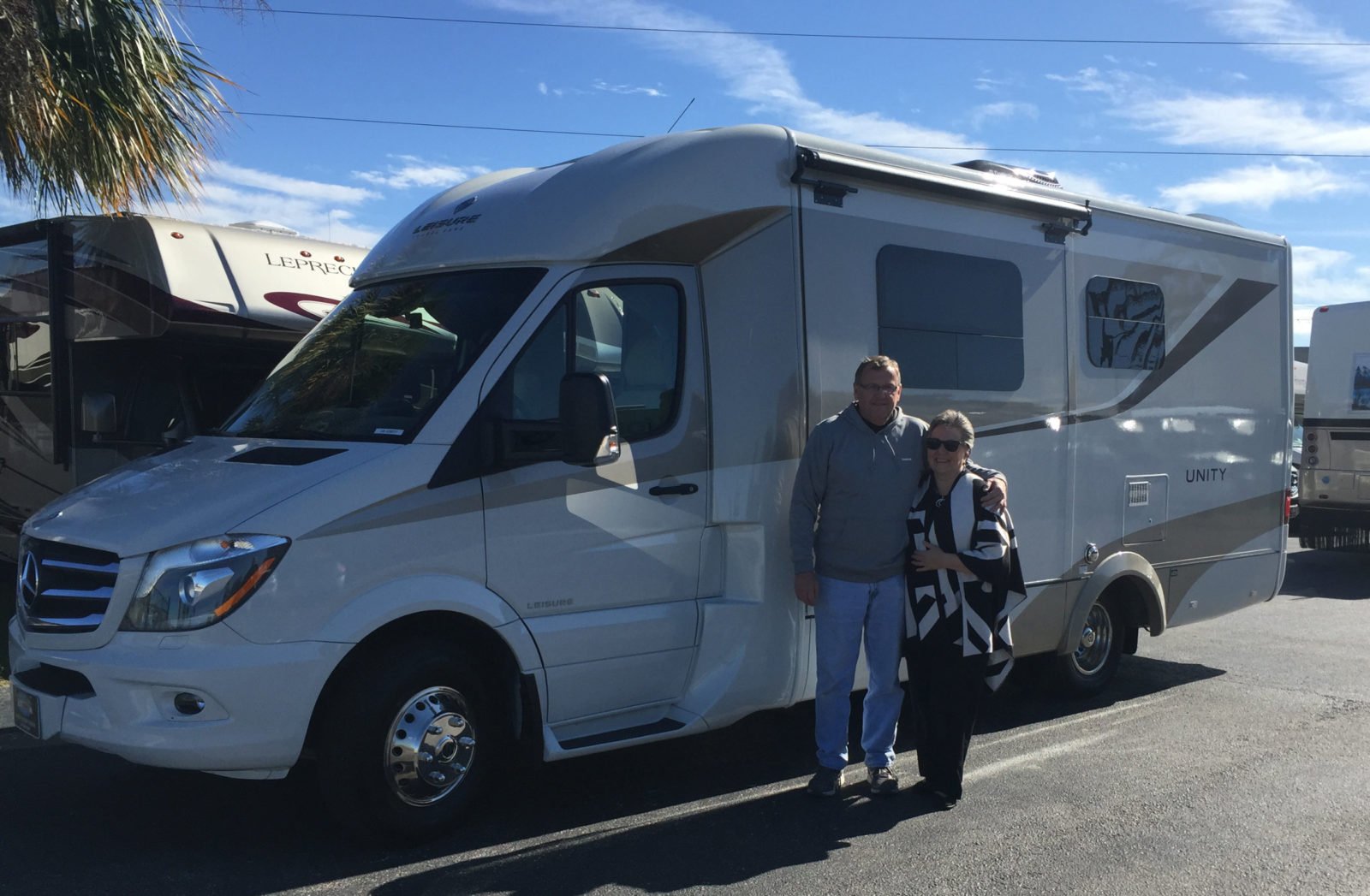
Did I choose the right RV, and would I choose differently now?
This is the top question I get from friends. What they really want to know is, would we buy a less expensive unit now that we have some experience. An easy answer here: we bought the perfect RV. It is maneuverable, well-made, and delightful to travel in. Though it seems small compared to a Class A, we are quite happy with the amount of space and would not trade up to a larger unit. As for buying a similar, less expensive unit? No, we would not change our decision to purchase from LTV. The Unity is beautifully made and LTV has been responsive to our rookie questions – far more so than the dealer!
What did you need to learn?
Having no experience with RVs, we faced quite a learning curve on how they work. The first clue to our knowledge gap came the day we picked up our Unity. It was beautiful in the Florida sunshine and, our heads swimming after a whirlwind “orientation” by the RV dealer’s service manager, we climbed into the unit and headed for a local campsite. We stumbled through our camping setup, trying to remember everything we had been told. We sat at the dinette and flipped on the coffee maker but nothing happened. Hmm.
Long story short, the inverter had been switched off. A phone call to the service manager at the dealer revealed he had already left for the day. So we called LTV. After a few questions, the gentleman guided us to the inverter and the reset button. All fixed! We were grateful for his patient and helpful demeanor. But sitting there drinking a cup of coffee, we realized we didn’t even know what an inverter was or what it did. With all the research we had done and all the questions we had asked our RV friends, RV systems never came up. We didn’t even know what we didn’t know!
When you own an RV, you learn a little bit about a lot of subjects. Electrical and plumbing systems are high on that list. Understanding the flow of electricity through your RV can help you diagnose where a problem might reside. The same holds true of the plumbing system and how your appliances use propane. These are subjects you might want to investigate. They may not be entertaining, but they are essential when things don’t work as they should.
All that said, the information was pretty easy to find. The huge binder of manufacturers’ documentation you get with your RV holds a wealth of information and service recommendations on every system and appliance (you can also find online access to the LTV help desk and your owner’s manual). In addition, we have found a lot of good information and even some help on the appliance manufacturers’ websites. When that fails, posting a question on the Sprinter forum or the LTV Enthusiasts Facebook page usually brings a helpful response from fellow owners.
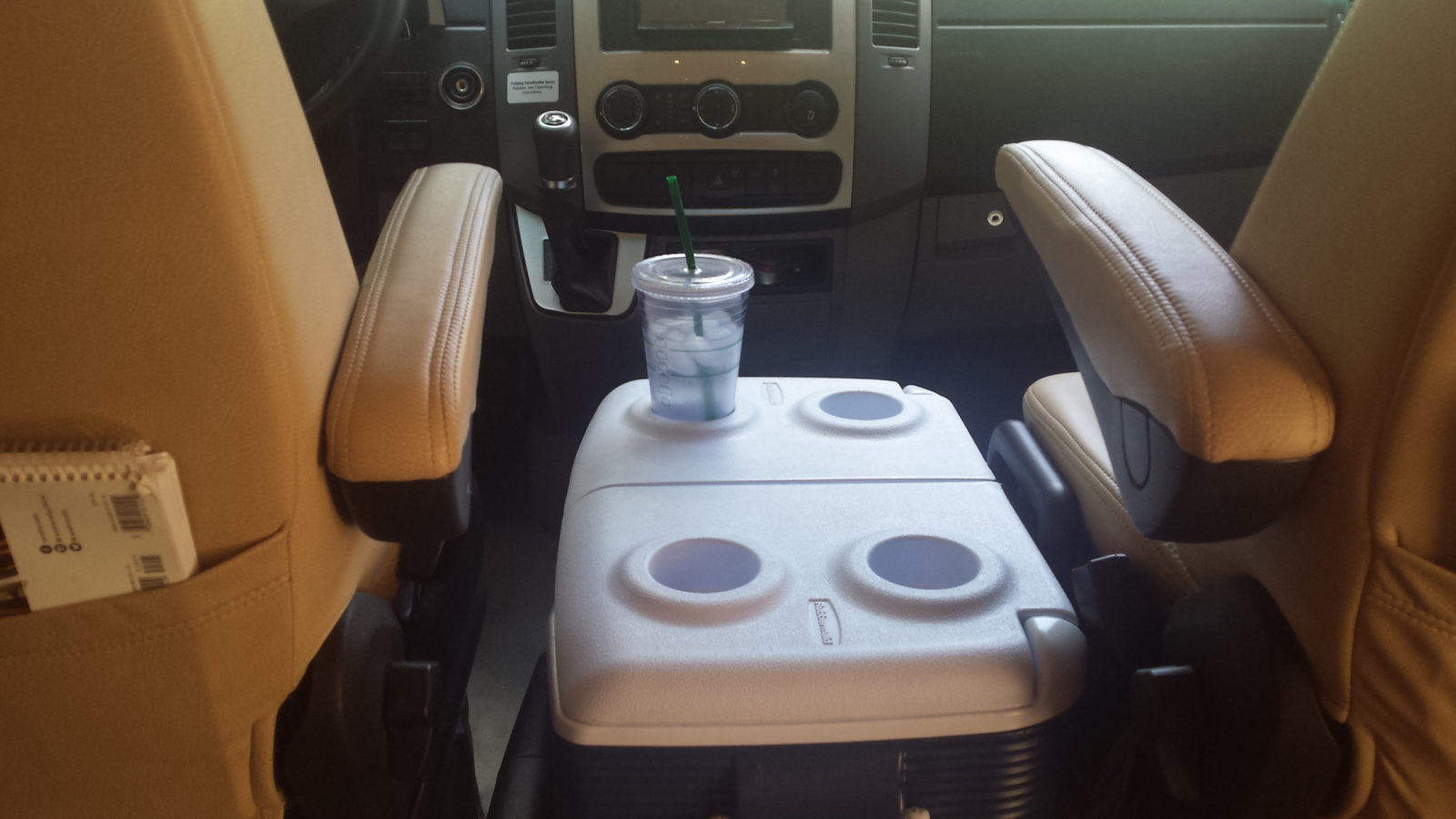
What about optional equipment?
We struggled with this when we bought our RV. There were a lot of options available and we limited ourselves to just a few items. In hindsight, it would have made so little difference in our monthly payment to purchase the options we wanted. If we bought new again, we would purchase any option to make travel as comfortable and convenient as possible!
How much did you have to spend on setting up your RV?
The question came from a good friend who had just bought their first RV. She wanted to know about kitchen equipment, campsite items, and anything else that would be needed. When Jim and I were waiting for our RV to be delivered, we poured over blogs about RV life. Almost every blog had a long list of products we “had to buy” for our new RV. We began working through some of those shopping lists after ordering our Unity, only to find that when our RV was delivered, many of those items were included by the manufacturer or the dealer!
Most new RVs are pretty self-contained, but there are things you might need or want to make the most of your unit. Since much of the basic equipment is provided by either the manufacturer or the dealer, our advice is to check with the manufacturer for what is included at delivery. Also, have a chat with your dealer to see what they provide that is included in the price of the RV. Then, add items as you need them.
For instance, we invested in an electrical adapter when the only campsite available had a 50 amp circuit (our Unity uses 30 amp). I work with computers, and a surge protector just made sense to me. In fact, it helped prevent damage when lightning struck the campground we were visiting – the surge protector blew, but the RV was spared any damage. A water pressure regulator allowed us to control the water flow at several campgrounds.
RVs have windshield curtains or blinds as a standard feature. We found using an exterior windshield cover and an insulated drape between the cab and the coach worked well to reduce heat or cold infiltration. Not a big deal, but if you’re camping in summer’s heat or winter’s cold, it is a lot more comfortable. These are items most people wouldn’t know about if they haven’t owned an RV before.
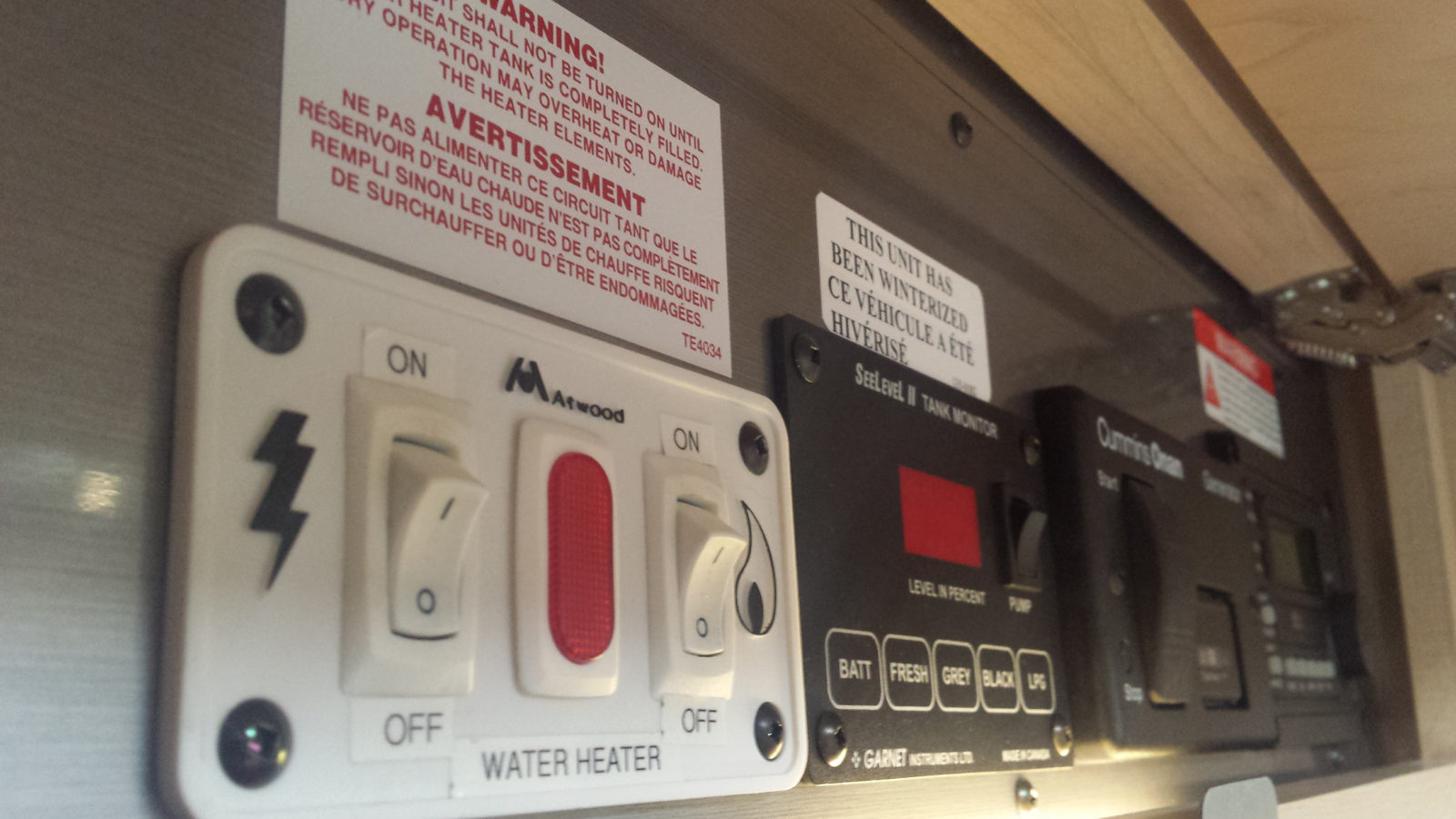
What about maintenance?
Every vehicle requires regular maintenance, and an RV is no different. From oil changes to checking tire pressure to filter replacements, maintaining the business part of your RV is much like you would expect maintaining your truck or car. However, there is more to an RV than just the vehicle end. You have a rolling home behind the driver’s seat!
That means maintenance similar to your household appliances, too. Changing the batteries on the smoke detector, servicing the propane stove and the microwave, and servicing the air conditioner and furnace are all part of RV maintenance. And there are a few non-home types of items you’ll have to monitor, like the holding tank levels, battery, solar panels, inverter, propane servicing, and generator maintenance. We have a spreadsheet of all the “mechanicals” to note when it was last serviced and when the next service is due.
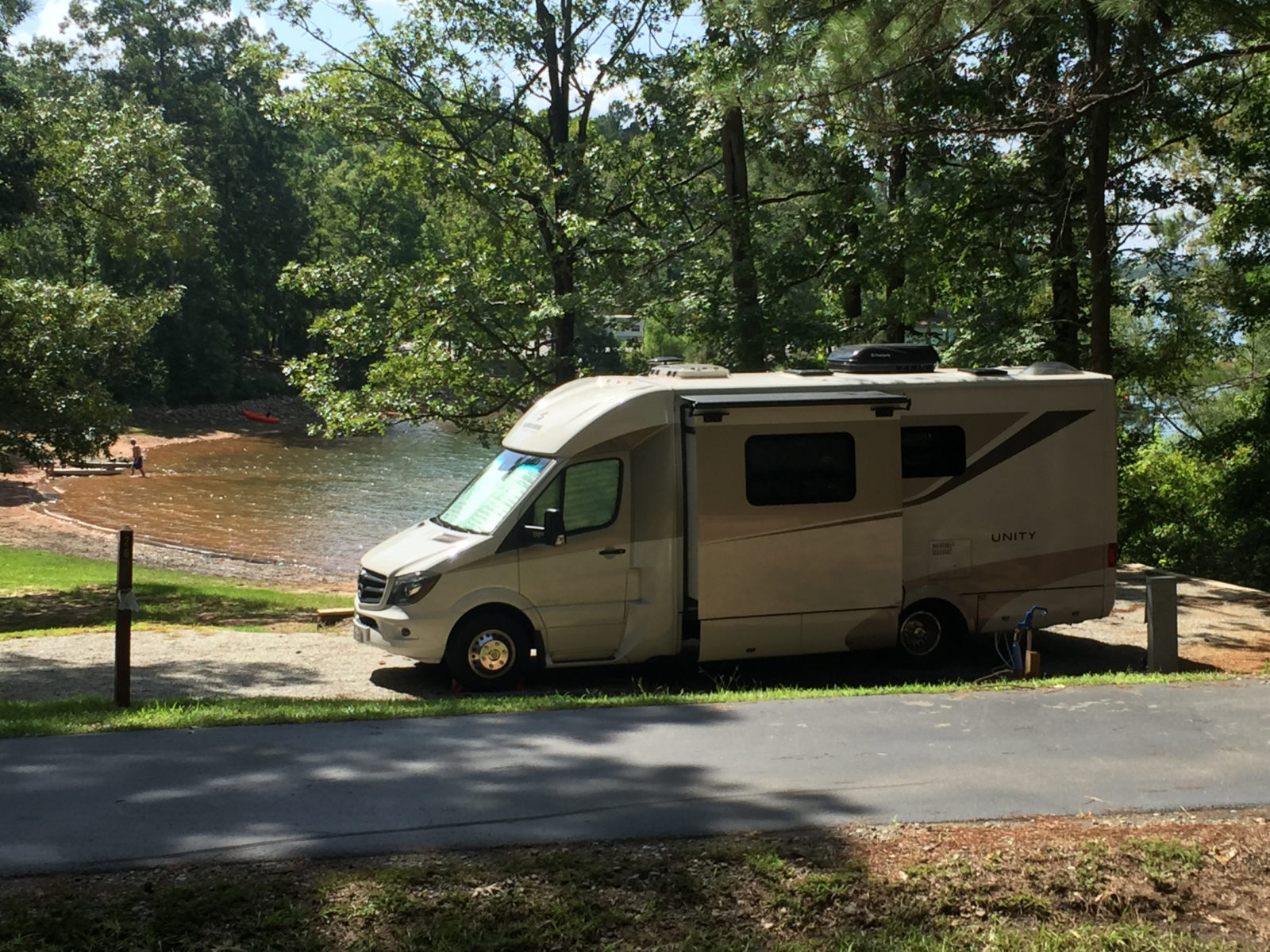
What about setting up camp?
The first order of business is to level the RV. If you are fortunate enough to have automatic levelers, this is really just a matter of pressing a button. If you don’t have auto levelers, you’ll have to use leveling blocks and a leveling app. Once you get used to the process it is pretty easy, even without auto levelers.
Hooking up the water and electrical service is pretty easy, too. In our Unity, it takes about 5 minutes! If there is a TV cable service offered, it might take an additional 2 minutes. Just check the campsite electrical outlet for any polarity issues (most surge protectors have an indicator for this) before you plug in. Then, hook up the water hose and you’re good to go. Breaking camp reverses the setup process and adds in dumping the tanks. Our Unity is equipped with a macerator, so dumping the tanks is a cleaner and easier process than manual dumping.
On the “pretty” side of the camp setup, how much of a campsite setup you want is a personal decision. We recommend taking along a doormat to use at the entrance steps. Some campsites are sandy, and a doormat helps keep some of that sand out of the unit. Tables and chairs should fold up and store easily in your unit’s storage bays. We found bag chairs and small end tables serve us well in camp. If you’re camping in the summer near water, a fan will keep some of the bugs away, and if you’re staying for a week or two bring a screen room!
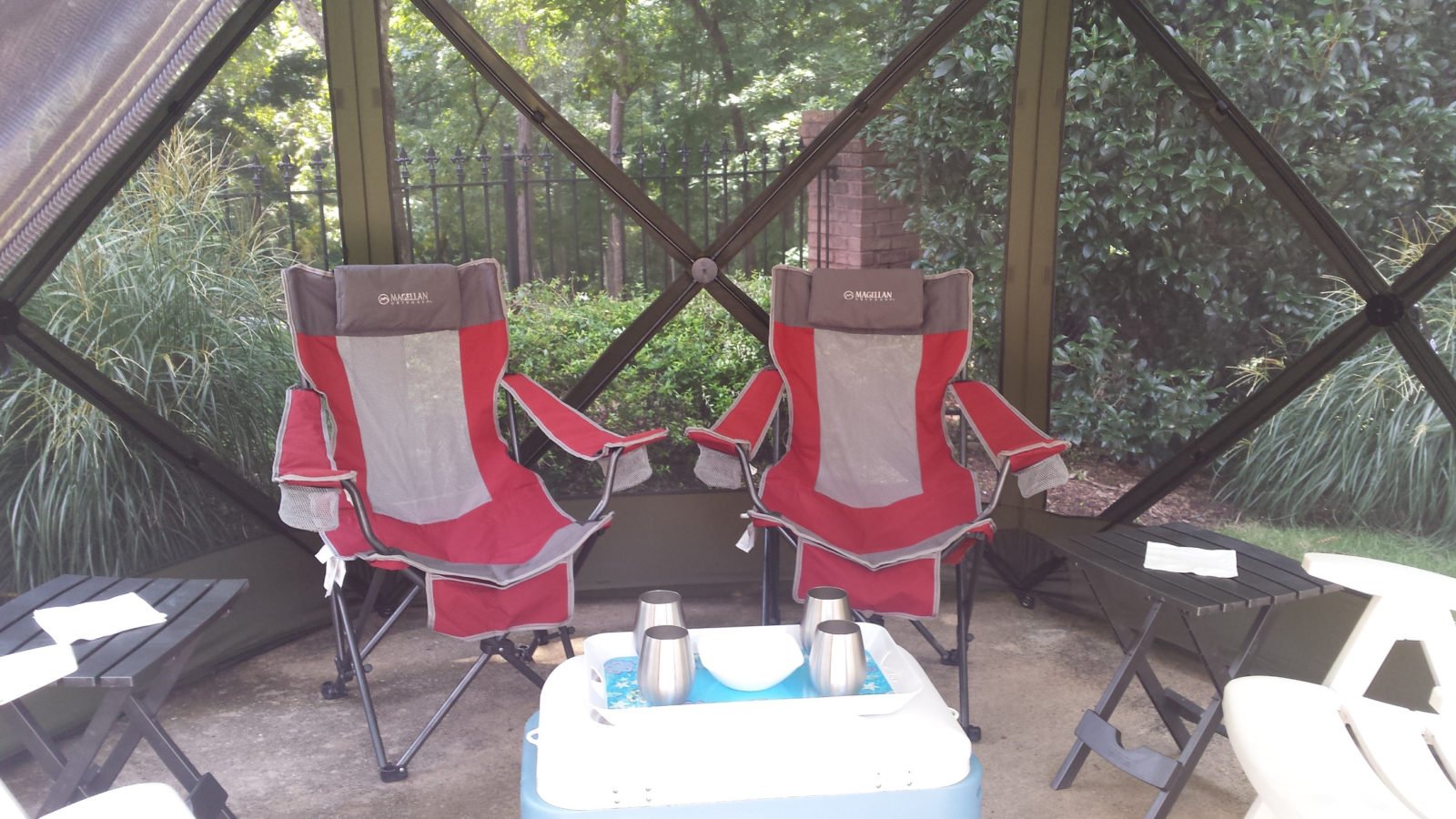
Consider how you will camp. If you plan on express touring – that is, going from place to place – you’ll want to keep your campsite setup simple. If you plan on traveling to one destination and staying for a week, you may want to bring a more comfortable campsite setup. Just keep in mind that a small RV is small on storage space, too!
What did you need for the inside?
Inside the RV, we thought we had to buy “RV specific” stuff. In reality, what you use at home in the way of linens, towels, and kitchen supplies can all be used in the RV. Before you buy anything, take the RV camping for a week and see what’s missing. You might be surprised at how much you don’t need and the odd little things you might want to buy just for fun.
What about aftermarket upgrades?
This is a tricky one. We added items particular to our tastes and needs. For instance, we are music lovers and the Mercedes stereo wasn’t quite what we wanted, so we replaced it with an upgraded system including door speakers and additional door insulation. I hate driving around big trucks, so we added sumo springs and a bigger sway bar to make passing 18-wheelers a lot less frightening. What you add aftermarket is really a matter of personal preference. Our Unity is pretty well-equipped and would be just fine without anything added.
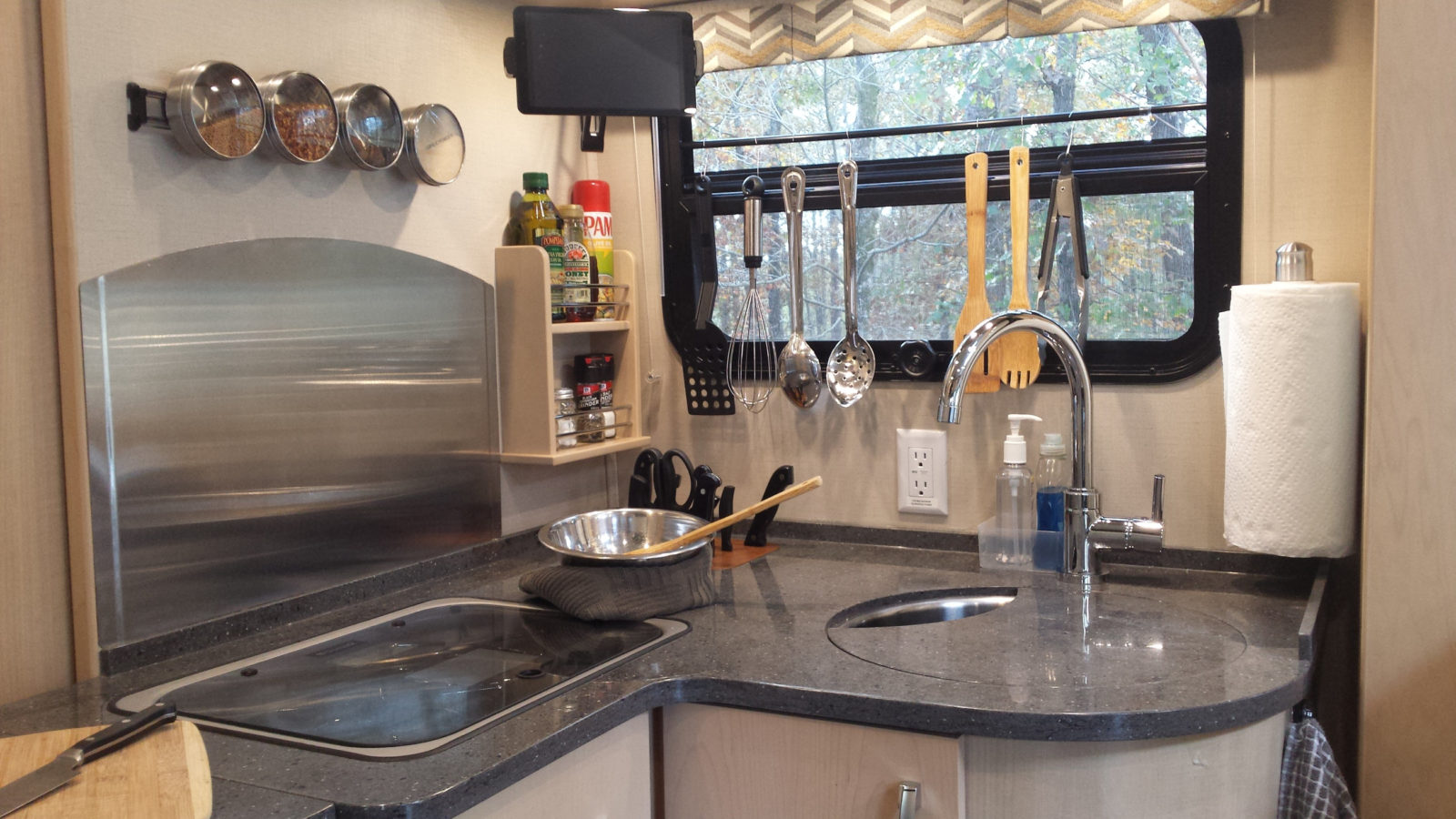
What else have you learned?
Lots of little things! Organizing the RV for the way you travel is important. This is your home away from home. We knew we would be on the road for long trips, and that meant making the RV as home-like as possible. Since we love to cook that meant getting the kitchen stocked for our culinary adventures. The propane stove works fine, as does the convection microwave, but we usually take along a glass table-top oven and an induction burner. Those two items allow us to cook outside or inside. Most people buy a grill, and that’s great, but we found we didn’t use it much, and when we did, it required more clean up than we wanted to do.
Speaking of clean up, we don’t use paper plates or disposable cups. They generate a lot of trash and in a small RV, the last thing you want to deal with is extra trash. Unbreakable dishware like Corelle works great. It’s break-resistant, washes up clean, and is lightweight. Rubberized shelf liner cushions dishes and flatware to stop any rattling in the cupboards.
If you like thermal coffee mugs, make sure you buy a size that fits the cup holders in your RV. We ditched a traditional coffee maker in favor of a French press. We found one made of steel with a thermal liner – it’s so easy to just boil water and pour it into the press. It makes breakfast a lot simpler when boondocking. Using a cooler for drinks and snacks means we keep the fridge door closed and the food cold.
Storage? Well, it’s a small RV, so the storage space is small. But that has not hindered our travel style at all. What it has done is make us more aware of what we really need and want to take along vs just taking a lot of stuff to fill the cupboards. Understanding where you can store items and then creating a packing list to use the available space is key. We edit our packing lists for every trip, taking the things that will make that particular trip more enjoyable. Sometimes we take the inflatable kayaks, sometimes we leave them home and take a portable screen room.
In the end, to answer my brother’s question and the questions of many friends, we feel like we bought the best RV for us. The LTV Unity is super and we would buy another without hesitation!
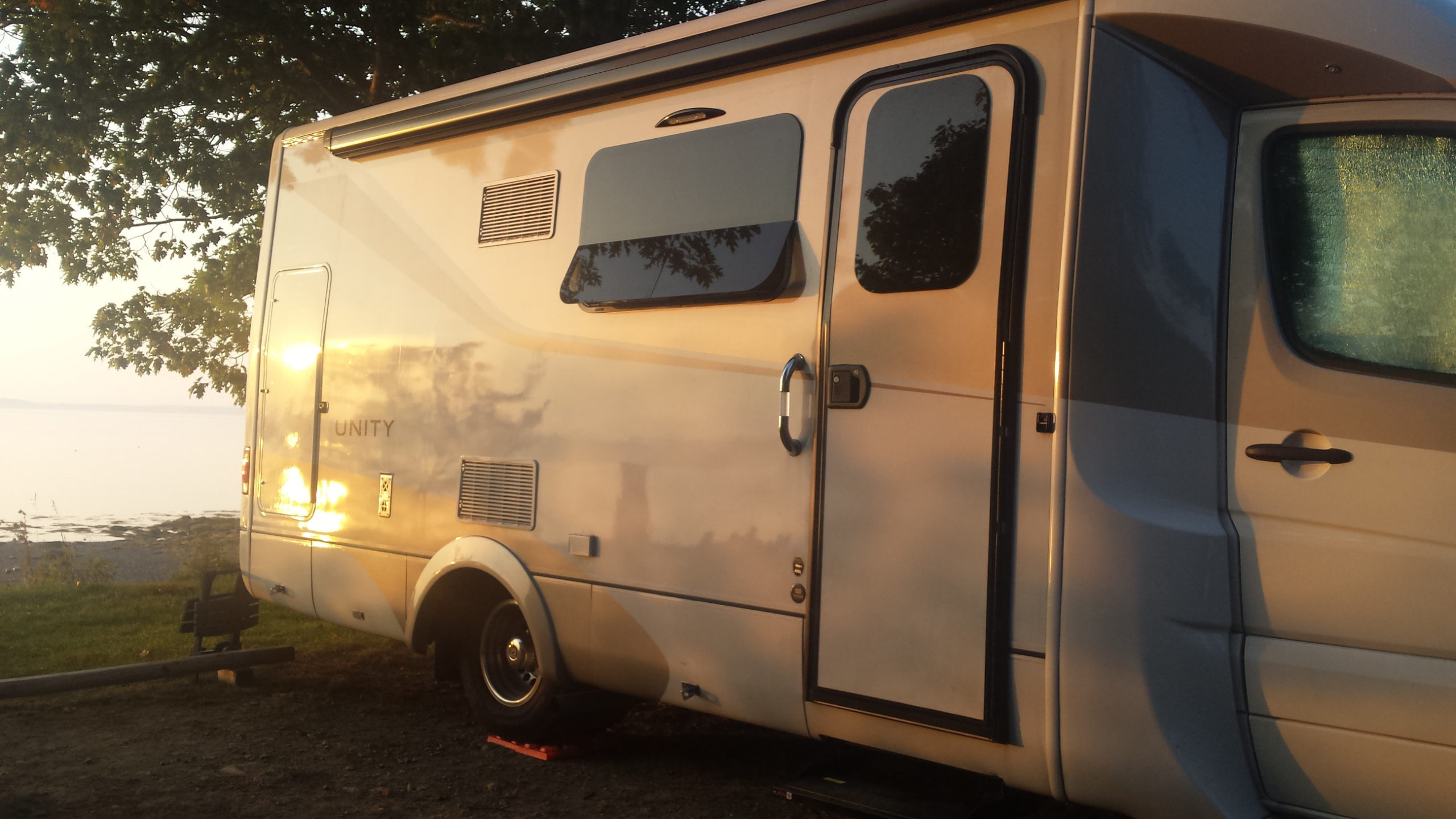


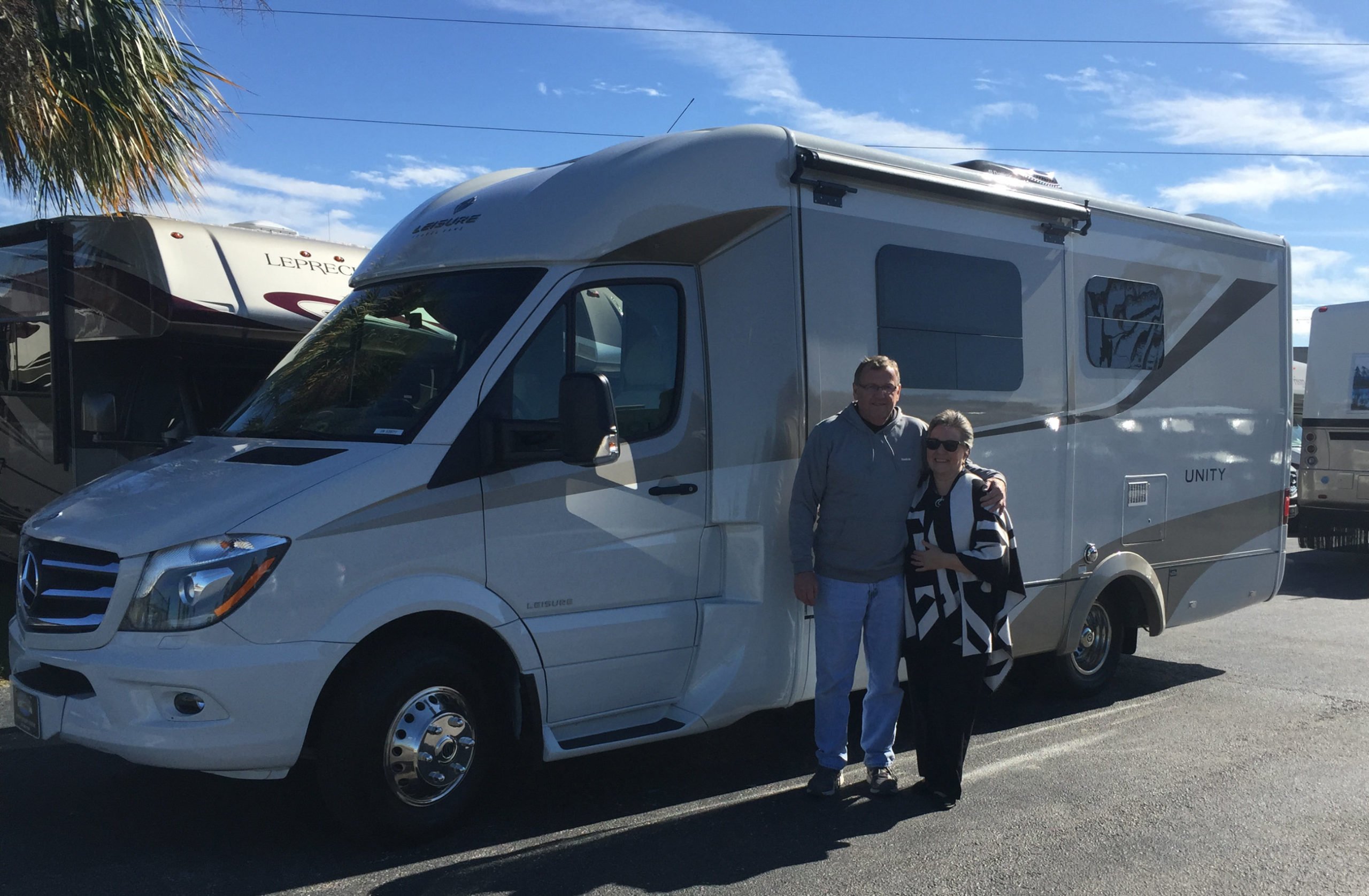
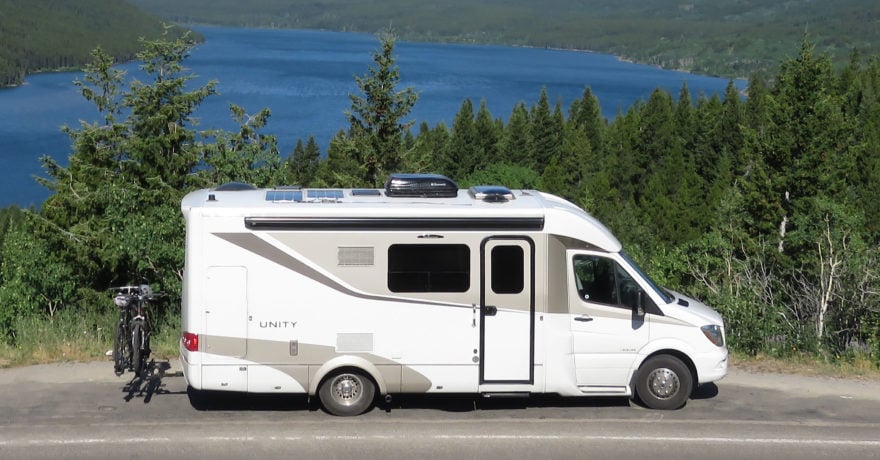
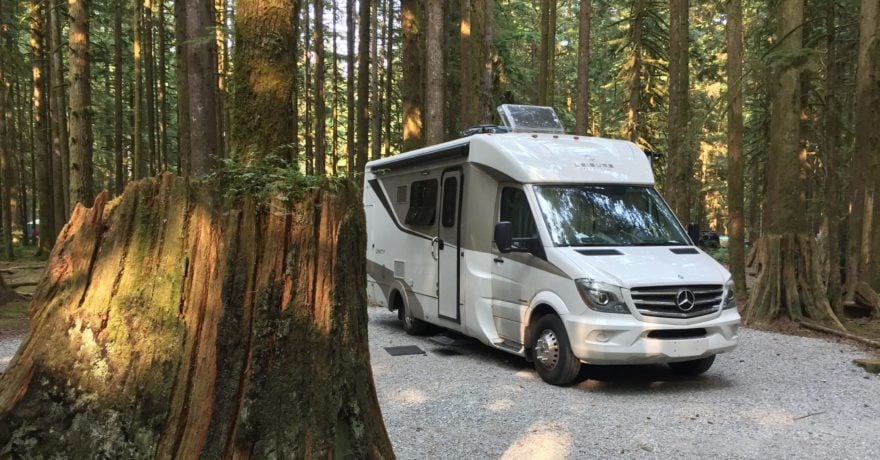
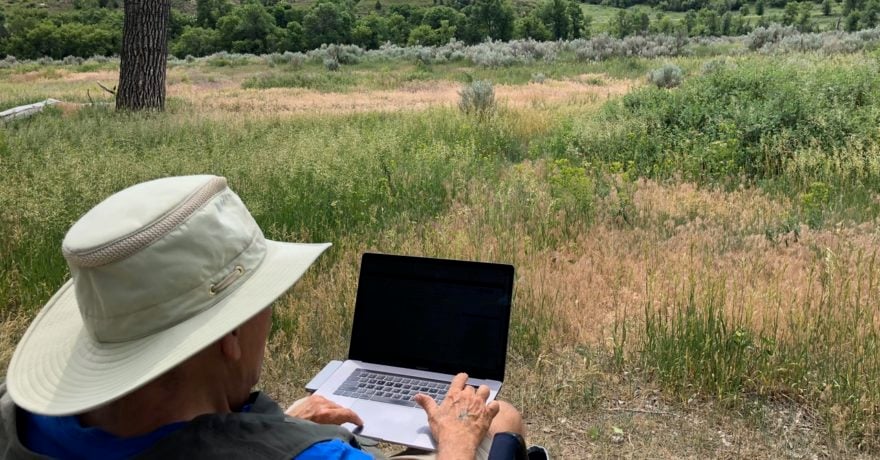
Comments